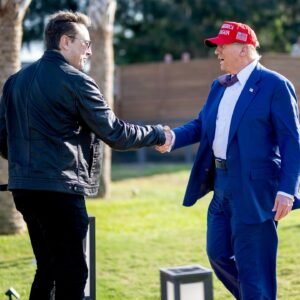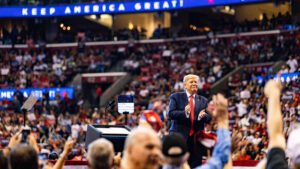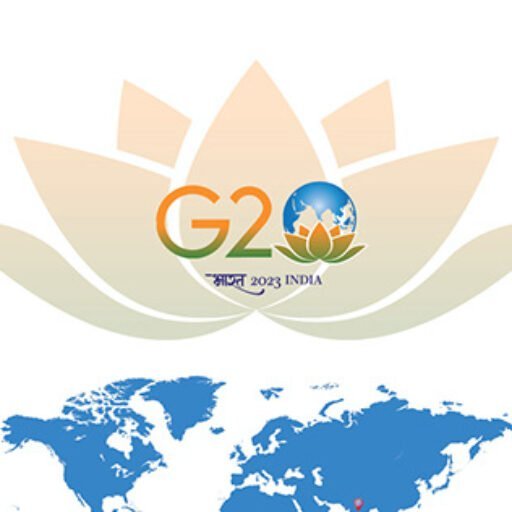
The growing bond between tech mogul Elon Musk and U.S. President-elect Donald Trump marks a potentially transformative moment in the nexus of technology, politics, and global influence. Both figures, known for their unconventional leadership styles, bold decision-making, and larger-than-life public personas, have disrupted their respective industries and established themselves as central figures in shaping public discourse. As their alliance strengthens, it raises important questions about the future of technology, governance, and the broader global trajectory.
A Shared Legacy of Disruption
Elon Musk, the visionary behind SpaceX, Tesla, and X (formerly Twitter), is renowned for challenging established norms and driving innovation. Through Tesla, Musk has revolutionized the electric vehicle industry, while SpaceX is leading advancements in private space exploration, aiming to make space travel accessible and sustainable. His acquisition of X (Twitter) further positioned him as an influential figure, not just in tech, but also in the world of politics and media.
Donald Trump, following his surprising victory in the most recent elections, is poised to return to the White House in January 2025. His presidency was marked by a disruption of traditional Republicanism, pushing the party towards populism and nationalism. Trump’s “America First” agenda, which emphasized protectionist trade policies, deregulation, and an assertive stance on immigration, left a lasting mark on U.S. politics and the global order. His ability to dominate headlines, shape the Republican narrative, and rally millions to his cause continues to make him a pivotal force in the U.S. political landscape.
Speculation on Future Collaboration
The growing speculation about a Musk-Trump collaboration stems from their shared inclination to disrupt the status quo. Their combined influence could create a powerful force for change in several sectors. Musk’s technological expertise could complement Trump’s political agenda, particularly in areas like digital infrastructure, renewable energy, and social media regulation. Musk’s rebranding of Twitter into X, a platform that has increasingly become a hub for conservative voices, fuels speculation that the two may find common ground in reshaping the digital public square.
Moreover, Trump’s emphasis on American industry and innovation aligns well with Musk’s vision for advancing renewable energy, artificial intelligence, and space exploration. Musk’s goal of creating a multiplanetary future through SpaceX could intersect with Trump’s “America First” approach, which might prioritize U.S.-led leadership in these high-tech sectors. This could create a dynamic partnership aimed at strengthening America’s role in technological and space advancements on the global stage.

Challenges and Criticism
Despite the potential benefits of a Musk-Trump collaboration, the union is not without its challenges and critics. Some worry that combining their influence could deepen political polarization and exacerbate divisions in the U.S. and abroad. Critics also argue that Musk’s libertarian leanings and Trump’s populist rhetoric might conflict, especially in areas like regulatory oversight and governance. While Musk champions a more free-market approach, Trump’s policies have at times been more interventionist and protectionist, leading to questions about how their collaboration would reconcile these differences.
Additionally, concerns are raised about the potential consolidation of power in the hands of a few influential figures. Musk already commands significant influence through his tech ventures, and Trump’s political clout remains potent. A partnership between the two could raise alarms about the erosion of democratic norms and regulatory frameworks, especially in an era where tech companies already hold immense sway over public discourse and policymaking.
Global Implications
If their partnership materializes, the impact on global politics, economics, and technological development could be profound. On the one hand, their combined leadership could push forward U.S. dominance in space exploration, renewable energy, AI, and digital infrastructure. Musk’s work on green energy, such as Tesla’s advancements in electric vehicles and solar energy, aligns with Trump’s potential efforts to stimulate U.S. industry and job creation, while also positioning the U.S. as a leader in climate technologies.
On the other hand, their collaboration could shift international diplomatic dynamics. Trump’s “America First” approach could align with Musk’s aspirations to assert U.S. leadership in high-tech industries, leading to new trade agreements or global competition in sectors like artificial intelligence, space exploration, and energy. However, critics may argue that such a partnership could exacerbate geopolitical tensions, particularly as the global balance of power shifts and rival nations vie for leadership in technological innovation.
Conclusion: A Story of Disruption
The Musk-Trump dynamic represents a powerful story of disruption, combining two of the most influential figures in technology and politics today. Should their partnership unfold, the world could witness a new era of technological progress, economic shifts, and geopolitical realignments. However, as with any potential alliance of this magnitude, the ramifications will likely be complex, with both positive and negative consequences. The ongoing speculation about their relationship speaks to the transformative potential they hold—not just for the U.S., but for the global order in the 21st century.
As the world watches this alliance unfold, one thing is certain: the Musk-Trump dynamic is a pivotal moment in the evolving intersection of politics and technology, one that could shape the future of global development for years to come.




